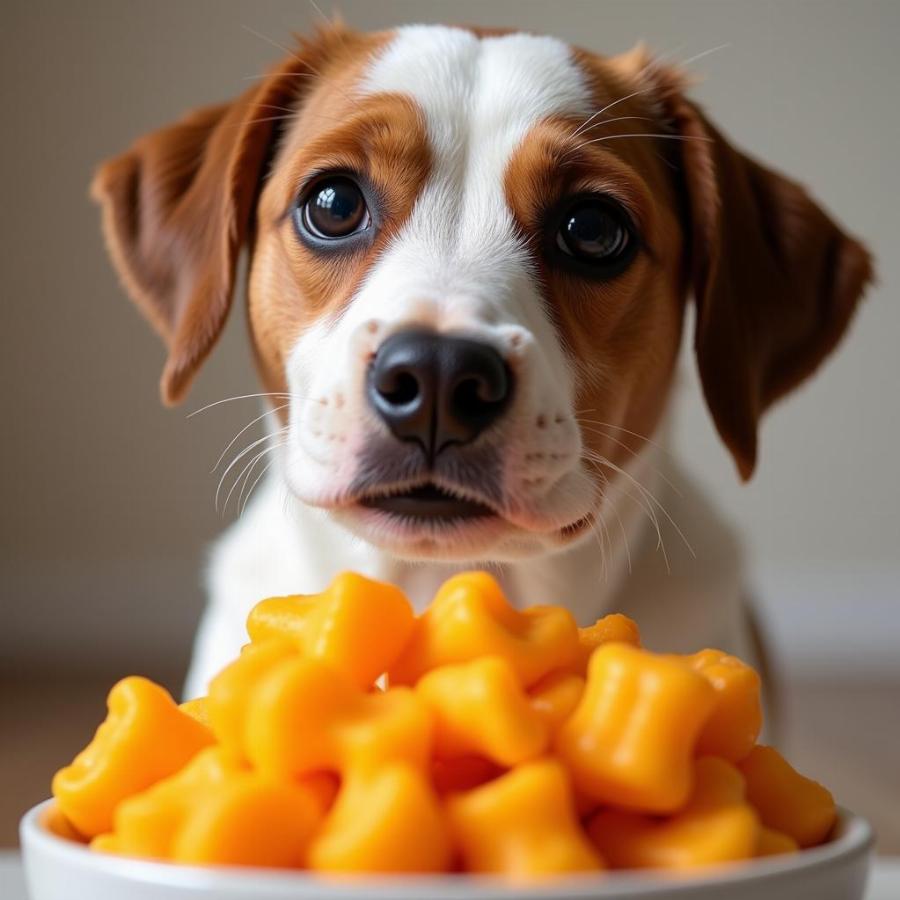Cheese curls. That bright orange, cheesy, crunchy snack that humans can’t seem to resist. But what about our furry friends? Can dogs indulge in this tempting treat, or are cheese curls a no-go for canines? The short answer is: it’s best to avoid giving your dog cheese curls. While a small amount likely won’t cause serious harm, they offer no nutritional value and contain ingredients that could be detrimental to your dog’s health in larger quantities.
The Cheesy Truth About Cheese Curls and Dogs
While the occasional cheese curl might not send your dog to the vet, they’re certainly not a healthy snack. Cheese curls are highly processed and packed with salt, artificial flavors, and preservatives – none of which are beneficial for your dog. High sodium intake can lead to dehydration, and in extreme cases, sodium ion poisoning. Artificial colors and flavors can cause allergic reactions in some dogs, manifesting as skin irritations or digestive upset.
What Makes Cheese Curls Unhealthy for Dogs?
Let’s break down the specific ingredients that make cheese curls a less-than-ideal snack for your furry companion.
- High Sodium Content: Excessive salt can lead to increased thirst, frequent urination, and in severe cases, even seizures or coma.
- Artificial Flavors and Colors: These additives can trigger allergic reactions, digestive issues, and potentially even contribute to hyperactivity in some dogs.
- Preservatives: While generally safe in small quantities, preservatives can contribute to long-term health problems if consumed regularly.
- Lack of Nutritional Value: Cheese curls offer virtually no nutritional benefits for dogs. They are empty calories that contribute to weight gain without providing essential vitamins or minerals.
 Dog looking longingly at a bowl of cheese curls
Dog looking longingly at a bowl of cheese curls
Are There Any Safe Alternatives to Cheese Curls for Dogs?
Absolutely! If you’re looking for a crunchy treat to share with your dog, there are plenty of healthier options available. Consider offering small pieces of plain, cooked chicken or lean beef, or opt for dog-specific treats that are low in sodium and free of artificial ingredients. Fruits and vegetables like carrots, apples (without the core and seeds), and blueberries can also be a healthy and refreshing snack for your dog.
Can Puppies Eat Cheese Curls?
Puppies are even more sensitive to the negative effects of unhealthy ingredients than adult dogs. Their developing digestive systems are not equipped to handle the high salt content and artificial additives found in cheese curls. It’s best to avoid giving cheese curls to puppies altogether.
What Should I Do If My Dog Eats Cheese Curls?
If your dog manages to snag a few cheese curls, don’t panic. A small amount is unlikely to cause serious harm. Monitor your dog for any signs of digestive upset, such as vomiting or diarrhea. If your dog consumes a large quantity of cheese curls, contact your veterinarian immediately.
What Human Snacks Are Safe for Dogs?
While many human snacks are off-limits for dogs, some can be enjoyed in moderation. Plain cooked chicken, plain yogurt, and certain fruits and vegetables like bananas, blueberries, and carrots can be healthy treats for your furry friend. Always introduce new foods gradually and in small quantities to monitor for any adverse reactions.
Conclusion
While sharing a cheesy snack with your furry friend might seem tempting, it’s best to stick to dog-friendly treats. Cheese curls offer no nutritional value and contain ingredients that can be harmful to dogs, particularly in large quantities. Opt for healthier alternatives that will keep your canine companion happy and healthy for years to come.
FAQ
- Can cheese curls kill a dog? A small amount is unlikely to be fatal, but large quantities can cause serious health problems due to the high sodium content.
- What are some healthy alternatives to cheese curls for dogs? Consider plain cooked chicken, lean beef, dog-specific treats, or fruits and vegetables like carrots and apples.
- What should I do if my dog eats a large amount of cheese curls? Contact your veterinarian immediately.
- Can puppies eat cheese curls? No, puppies are even more sensitive to the negative effects of cheese curls and should not eat them.
- Are all human snacks bad for dogs? No, some human snacks like plain yogurt, certain fruits, and vegetables can be given in moderation.
- What are the signs of sodium poisoning in dogs? Excessive thirst, frequent urination, vomiting, diarrhea, tremors, seizures, and even coma.
- Why are artificial flavors and colors bad for dogs? They can trigger allergic reactions, digestive issues, and potentially contribute to hyperactivity.
Further Reading
- Dog Nutrition Basics
- Understanding Dog Food Labels
- Toxic Foods for Dogs
Beaut Dogs is your go-to resource for all things canine. We provide reliable, in-depth information on dog breeds, care, and much more. When you need assistance, please contact us at Email: [email protected] for detailed and accurate answers. Visit https://beautdogs.com today to explore the wonderful world of dogs!